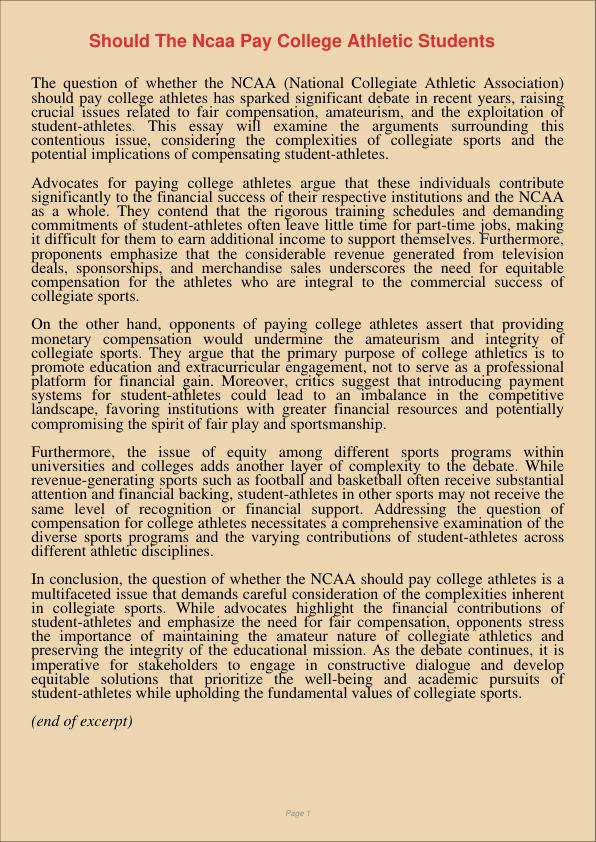Should The Ncaa Pay College Athletic Students
Jan 6, 2024
ncaa pay college athletic students
Visual Arts & Film Studies
Engineering and Construction
The question of whether the NCAA (National Collegiate Athletic Association) should pay college athletes has sparked significant debate in recent years, raising crucial issues related to fair compensation, amateurism, and the exploitation of student-athletes. This essay will examine the arguments surrounding this contentious issue, considering the complexities of collegiate sports and the potential implications of compensating student-athletes.
Advocates for paying college athletes argue that these individuals contribute significantly to the financial success of their respective institutions and the NCAA as a whole. They contend that the rigorous training schedules and demanding commitments of student-athletes often leave little time for part-time jobs, making it difficult for them to earn additional income to support themselves. Furthermore, proponents emphasize that the considerable revenue generated from television deals, sponsorships, and merchandise sales underscores the need for equitable compensation for the athletes who are integral to the commercial success of collegiate sports.
On the other hand, opponents of paying college athletes assert that providing monetary compensation would undermine the amateurism and integrity of collegiate sports. They argue that the primary purpose of college athletics is to promote education and extracurricular engagement, not to serve as a professional platform for financial gain. Moreover, critics suggest that introducing payment systems for student-athletes could lead to an imbalance in the competitive landscape, favoring institutions with greater financial resources and potentially compromising the spirit of fair play and sportsmanship.
Furthermore, the issue of equity among different sports programs within universities and colleges adds another layer of complexity to the debate. While revenue-generating sports such as football and basketball often receive substantial attention and financial backing, student-athletes in other sports may not receive the same level of recognition or financial support. Addressing the question of compensation for college athletes necessitates a comprehensive examination of the diverse sports programs and the varying contributions of student-athletes across different athletic disciplines.
In conclusion, the question of whether the NCAA should pay college athletes is a multifaceted issue that demands careful consideration of the complexities inherent in collegiate sports. While advocates highlight the financial contributions of student-athletes and emphasize the need for fair compensation, opponents stress the importance of maintaining the amateur nature of collegiate athletics and preserving the integrity of the educational mission. As the debate continues, it is imperative for stakeholders to engage in constructive dialogue and develop equitable solutions that prioritize the well-being and academic pursuits of student-athletes while upholding the fundamental values of collegiate sports.
